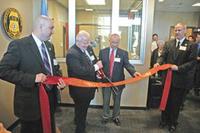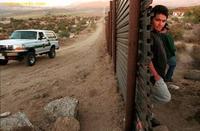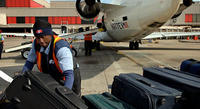-
More mass graves unearthed in Mexico

The number of bodies found in mass graves in north-eastern Mexico over the past week has risen to 88, after 16 more corpses were discovered; the graves are the largest concentration ever found in one area in Mexico; a gang member who participated in the killing told police that most of the victims were travelling through the area on buses; the motive for the killings remains unclear; the graves resemble the discovery last August of the bodies of seventy-two Central and South American migrants, who were killed in the same town for refusing to join the ranks of the cartel which had abducted them
-
-
Federal court upholds ruling against Arizona immigration law

A federal appeals court ruled against the controversial Arizona immigration law stating that it was a violation of the constitution; the Ninth U.S. Circuit Court of Appeals upheld a stay blocking the implementation of significant portions of the Arizona immigration law stating that immigration enforcement was a federal responsibility and the Arizona law overstepped its bounds; last month five additional immigration bills failed to pass through the Arizona legislature including the highly controversial attempt to deny children of illegal immigrants birthright citizenship; experts believe that the bills failed largely as a result of the business community’s opposition
-
-
Sector Report for Thursday, 7 April 2011: Border / Immigration control
This report contains the following stories.
Plus 1 additional story.
-
-
A Jordanian solution for SBInet replacement?
After spending nearly $1 billion dollars and five years on the now defunct virtual border fence project known as SBInet, DHS is still actively seeking to build a high tech virtual border along the southern border; this time, DHS is determined to purchase technology that meets performance standards and is delivered on time and at cost; DHS hopes to invest an additional $750 million to purchase mature sensor and surveillance technology; to ensure the project’s success, DHS is exploring off the shelf projects that can “plug and play” with hardware and software from other suppliers; contracts will be terminated if they are delivered late, fail to meet performance standards, or are over initial costs projections
-
-
U.S. gets more deeply involved in Mexican drug war
As the war against Mexico’s deadly drug cartels rages on, American law enforcement agents are getting more deeply involved than ever before; the United States has primarily provided intelligence and training, while Mexican forces perform kinetic operations; despite these closely coordinated efforts to battle the drug cartels, U.S involvement has created friction on both sides of the border; Mexican officials downplay the presence of U.S. agents and their scope of responsibility fearing public backlash; critics in the United States fear that the violence is spilling over; the stepped up policing efforts have led to mixed results
-
-
How many people from terrorism-sponsoring states enter the U.S. illegally?
Senator John Cornyn (R-Texas) says the United States arrested people from nations designated as terrorism sponsors on the border with Mexico in the first nineteen months of Obama administration; an Austin newspaper investigated this claim and reached these conclusions: Cornyn is right that there were arrests of people from the four states designated by the United States as sponsoring terrorism (Cuba, Iran, Sudan, and Syria) — but: the number of people from these states arrested on the Mexican border is miniscule (0.02 percent of the 540,865 total arrests on the southwestern border in fiscal 2009); 87 percent of the people from these countries arrested while trying to enter the United States illegally do so through the Canadian border; and the numbers are dropping: there were 3,309 apprehensions of people from terrorism-sponsoring countries in 2005 (when Libya and North Korea were also on the list), 935 apprehensions in 2009, and 736 in fiscal 2010
-
-
New joint U.S. - Canada border surveillance post opened in Michigan
Last month a sophisticated new surveillance center was opened in northern Michigan to monitor the U.S.- Canada border; the $30 million, 9,000 square foot facility, located at the Selfridge Air National Guard Base, will act as a joint command center for Custom and Border Protection, the FBI, Coast Guard, state and local law enforcement officials, and even Canadian police; the command center will receive real time feeds from eleven surveillance cameras installed on towers alongside the St. Clair River; agents at the new surveillance center will be keeping an eye on drug smuggling, human trafficking, and illegal crossings related to terrorist activity
-
-
Making better decisions on border security
Researchers developed a high-fidelity simulation and analysis program that aids policy and decision-makers tasked with making key procurements and funding choices; the program is a gaming platform originally designed to prepare decision-makers and first responders for weapons of mass destruction/weapons of mass effect (WMD/WME) attacks in metropolitan areas
-
-
ICE opens office in northern Michigan

The U.S. Immigration and Enforcement agency (ICE) recently opened a permanent facility in northern Michigan; the new ICE office will provide work space for agents conducting enforcement removal operations (ERO) and homeland security investigations (HSI); the 10,000 square-foot facility will include an evidence-processing room, modern offices, and a short-term holding cell; the facility will help ICE agents secure America’s northern border;a recent Government Accountability Report found that only thirty-two miles of the nearly 4,000 mile long northern border had “an acceptable level of security”
-
-
Officials battle over safe border claims

Last week during a visit to the U.S. Mexico border in El Paso, Texas, Homeland Security Secretary Janet Napolitano declared that the border is safer than ever; according to El Paso mayor John Cook, El Paso is the safest city of its size in the United States, despite sitting across Ciudad Juarez, Mexico, which has been hit hard by the bloody gang wars raging across Mexico; Napolitano’s remarks have generated sharp criticism from those who believe that the situation along the border has grown increasingly worse; in February, there were nearly 230 execution style killings in Ciudad Juarez and last December Brian Terry, a Border Patrol agent, was killed in the line of duty while deployed along the border
-
-
Eyeless in Libya -- and a Swiftian border security solution
Everyone knows what the Libyan rebels are against — Gaddafi — but there is no way tell what they are for; this lack of information is not good; first, the United States and its allies may be pushing for the replacement of the devil we know with the devil we do not know; this is akin to giving Michael Phelps a three body length advantage at a swim meet: not a good idea; second, the lack of knowledge about the rebels is like a Rorschach test: outsiders look at them and see what they want to see; Jonathan Swift suggests that impoverished Irish might ease their economic troubles by selling their children as food for rich gentlemen and ladies; should we consider a Swiftian solution to problem of securing the U.S.-Mexico border?
-
-
Report recommends abolishing fees for checked bags

A recent report by the U.S. Travel Association (USTA) found that airlines’ policy of charging for checked bags cost DHS additional money, increased wait times at airport checkpoints, and discouraged people from flying; the airport check-in fee and the additional hassles of flying have discouraged people from taking two to three trips a year resulting in the loss of roughly $85 billion in potential consumer spending; the report suggested that the Department of Transportation issue regulations that required airlines to allow passengers one checked bag at no additional charge; it also recommended the implementation of a trusted traveler program
-
-
Corruption in academic accreditation
Little-known colleges, most unaccredited, exploit Byzantine federal regulations, enrolling almost exclusively foreign students and charging them upward of $3,000 for a chance to work legally in the United States; they flourish in California and Virginia, where regulations are lax, and many of their practices are shoddy — for instance, holding some classes on only three weekends per semester; these colleges usher in thousands of foreign students and generate millions of dollars in profits because they have the power, bestowed by the U.S. government, to help students get visas
-
-
Sector Report for Thursday, 24 March 2011: Border / Immigration control
This report contains the following stories.
Plus 1 additional story.
-
-
U.S. works closely with Mexico to curb power of cartels
The United States is already involved in the spiraling violence which threatens to make Mexico into a failed state: hundreds of thousands of U.S.-made firearms are bought at U.S. gun shows and then smuggled into Mexico to arm the cartels; but there is another aspect to U.S. involvement: more and more American agents are operating in Mexico to stem the flow off drugs into the United States and curb the power of the cartels; U.S. agents generally provide intelligence and training, while Mexicans do the hands-on work; neither side will say exactly how many agents are in Mexico, citing security concerns
-
- All
- Regional
- Water
- Biometrics
- Borders/Immig
- Business
- Cybersecurity
- Detection
- Disasters
- Government
- Infrastructure
- International
- Public health
- Public Safety
- Communication interoperabillity
- Emergency services
- Emergency medical services
- Fire
- First response
- IEDs
- Law Enforcement
- Law Enforcement Technology
- Military technology
- Nonlethal weapons
- Nuclear weapons
- Personal protection equipment
- Police
- Notification /alert systems
- Situational awareness
- Weapons systems
- Sci-Tech
- Sector Reports
- Surveillance
- Transportation
Advertising & Marketing: advertise@newswirepubs.com
Editorial: editor@newswirepubs.com
General: info@newswirepubs.com
2010-2011 © News Wire Publications, LLC News Wire Publications, LLC
220 Old Country Road | Suite 200 | Mineola | New York | 11501
Permissions and Policies
Editorial: editor@newswirepubs.com
General: info@newswirepubs.com
2010-2011 © News Wire Publications, LLC News Wire Publications, LLC
220 Old Country Road | Suite 200 | Mineola | New York | 11501
Permissions and Policies
